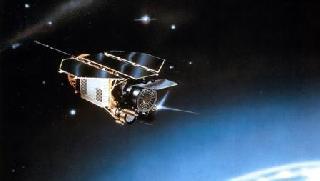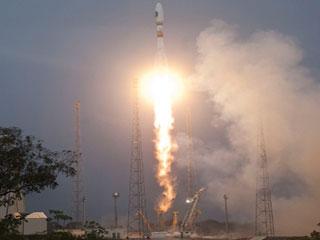
Artist's impression of the ROSAT satellite. Photo: German Aerospace Center.
BERLIN (AP): A defunct satellite hurtled toward the atmosphere and pieces of it were expected crash to the Earth within hours, the German Aerospace Center said early Sunday.
Pieces of the ROSAT scientific research satellite were expected to hit Sunday morning about 0600 and 1100 IST the agency said.
Most parts of the minivan-sized satellite were expected to burn up during re-entry into the atmosphere but up to 30 fragments weighing 1.87 tons (1.7 metric tons) could crash into Earth at speeds up to 280 mph (450 kph).
The satellite orbits every 90 minutes and it could hit almost anywhere along its path a vast swath between 53-degrees north and 53-degrees south that comprises much of the planet outside the poles, including parts of North America, South America, Europe, Africa and Asia.
"According to the data we currently have, we expect it not to hit over Europe, Africa or Australia," agency spokesman Andreas Schuetz said."The satellite is still orbiting and we are observing the data for other parts of the world," he added.
Fluctuations in solar activity and the fact that scientists are no longer able to communicate with the dead satellite render predictions of where and when it will come down yet more difficult.
The 2.69-ton (2.4 metric ton) scientific ROSAT satellite was launched in 1990 and retired in 1999 after being used for research on black holes and neutron stars and performing the first all-sky survey of X-ray sources with an imaging telescope.
The largest single fragment of ROSAT that could hit into the earth is the telescope's heat-resistant mirror. During its mission, the satellite orbited about 370 miles (600 kilometers) above the Earth's surface, but since its decommissioning it has lost altitude, circling at a distance of only 205 miles (330 kilometers) above ground in June for example, the agency said.
 Previous Article
Previous Article Next Article
Next Article









The Indian Air Force, in its flight trials evaluation report submitted before the Defence Ministry l..
view articleAn insight into the Medium Multi-Role Combat Aircraft competition...
view articleSky enthusiasts can now spot the International Space Station (ISS) commanded by Indian-American astr..
view article